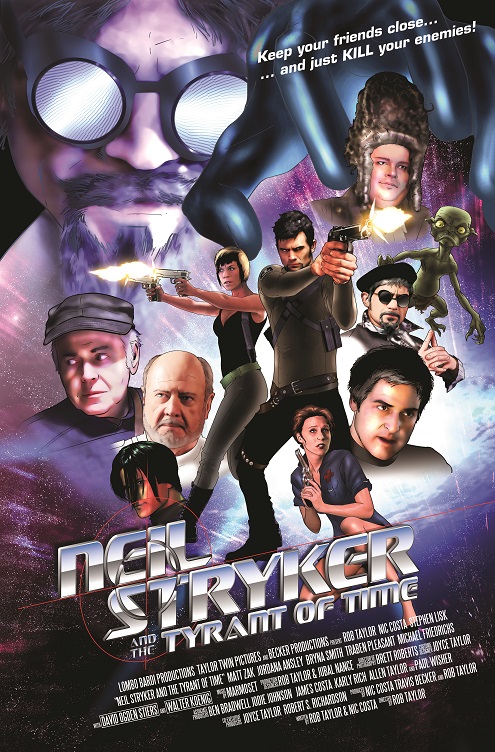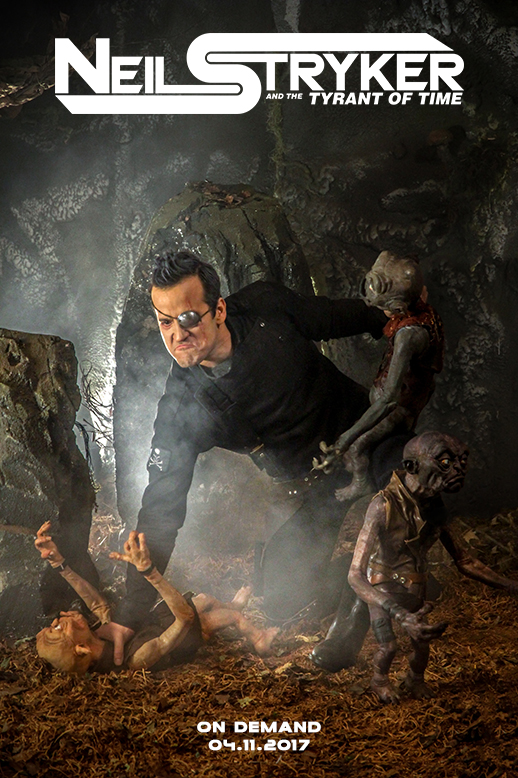Neil Stryker and the Tyrant of Time is a true labor of love. A comedic sci-fi action 10 years in the making, Neil Stryker is the brainchild of Portland natives and best friend duo, Rob Taylor and Nic Costa. The film has come a long way from where it began — requiring years of filming and re-filming, hundreds of helping hands, and even Costa’s brief stint in law school to bring it from a seedling of an idea to a soon-to-be cult classic.
Scored almost entirely by local artists on our roster, we are proud to be a part of this iconic tribute to geekdom. After making rounds at festivals around the globe, Neil Stryker and the Tyrant of Time is finally available for streaming on iTunes, On Demand, Amazon, PlayStation, Xbox and will be hitting stores on Blu-ray soon. We caught up with the masterminds behind this decade-long project to discuss the final product, wearing different hats and collaborating with your best friend.

Tell us the story behind Neil Stryker. When did the concept start, and then the process leading up till now.
Rob Taylor: Well, the character has been around for a long time. Me and my brother co-directed a film in 2003 called Evil Cult. A straight to DVD splatter comedy, which was fun. But it’s shot on standard definition video…It is what it is.
But, the characters, I really loved, and I wanted to bring them back to life in another film. So, me and Nick sat down and wrote a new screenplay in that same year. And then, in the late 2000s, we started shooting.
Nic Costa: 2006
So this film has been a long time coming.
RT: Indeed.
NC: Oh yeah. The idea was, this would be a prequel to this film no one’s heard of. But it’s supposed to stand alone, and it does. So, you don’t need to watch Evil Cult. You don’t want to watch Evil Cult.
Although, in its defense, I got an email even this week from someone who knew about Evil Cult and was like, “Dude, this is the film I show to new friends to literally qualify them whether or not that can be my friends. It’s like a test I use. If you can enjoy this movie, you’re cool with me.”
RT: That’s hilarious.
NC: So yeah, that’s kind of how it happened. We started in 2006, shooting with inferior equipment, and as we progressed, we realized more and more we were gonna need money and more resources. We were literally doing a sci-fi-action-adventure-comedy-thriller that took place in the future, with zero dollars.
Eventually, we ended up re-shooting what we did in 2006 with $4,000 and then we did a Kickstarter campaign in 2011, raised $10,000, which we thought at the time was like a fortune, which we burned through in like a summer. And then it was just like, “Okay, what are we going to do now?” F**k it, Rob. I’ll go to law school, I’ll make the big bucks and then we’ll find us the picture!”
RT: That’s pretty much how it went.
NC: It’s literally what we did.
No way.
NC: So I like to say that I died a little bit cause that’s what law school is — dying a little bit every day — so that Rob could live. And live he does. And live he shall.
So you guys are obviously really tight. How did you two first meet?
RT: We actually met when you [Nick] were a junior and I was a sophomore and —
NC: You were doing movies.
RT: I was making little movies cause that’s what I’ve been doing since I was 12.
NC: He made this movie called People to Kill.
RT: Yeah. That was our Tarantino inspiration back when we were little younger high schoolers, but I couldn’t keep the comedy out and I think that’s where we had a big connection cause he’s all about the comedy and so am I. So, I saw a talent there, and when he saw my films he saw a talent there so we started talking.
NC: And we were fast friends after that.
So, Neil Stryker is kind of looked at as a future cult classic and has a very specific humor and audience. Who is going to love this film?
NC: You know what? I think we nailed it on the press release. It’s just like okay, Venture Bros, sure that was for the millennials, but also it’s like Big Trouble Little China with a Labyrinth flare. Like old school Jim Hanson flare. And with a mix of like Dirty Harry inside of an old school Star Trek episode. So if any of that gets you excited for any reason, you’re probably gonna find something interesting in this film that’s just for you.
As independent filmmakers, you have to wear a lot of different hats. You’re directing, acting, producing — everything. Do you think that manifests itself in the film?
RT: I think so. It’s all we’ve ever known as far as how to make a movie. And it does show — the fact that we wrote it and that we’re acting. We wrote these lines to be performed this way and no one else can possibly do it, so that’s why we insisted on playing multiple roles. When we didn’t play the part and the actor did it their own way, sometimes it was great and we’re like, “That’s great!” And sometimes it’s like, “Well, uh, it’s okay but….”
NC: Rob and I, actually had a literary agent for a minute in LA and we were cranking out the screenplays. And they would read it and of course we would have like “emphasize like this.” Clear direction of how to say a line to get the laugh and our agent was just like, “You can’t do that. Okay? I mean write the line, fine. But you’re not directing this thing.
NC: And we said, “We’ll show you.”
Can tell us about how the soundtrack came together?
RT: Well, when we were editing scenes early, we would just get random movie scores to fill it in to get the vibe we were going for. And then after that, we started looking for websites that license music….How did we find Marmoset?
NC: So, I went to dinner with Victoria [Semarjian, Marmoset Senior Project Manager] over here one night and I was unfamiliar, actually, with Marmoset, but we were at that point where we needed to start working on the post and the music. And she was just like, “Oh my god, this is what we do! You gotta come down here.” So she hooked me up with Eric Nordby, and he has just been a godsend through this whole process. It’s all Portland music and it was just perfect. This is like the perfect marriage. There couldn’t be any more Portland film than this film. And so we just started sending him scenes. And he had this little team put together and they would be like, “Okay, what kind of vibe you going for?” And we’d be like, “Spaghetti western.”
And they just about nailed every time.
So, it sounds like the soundtrack is a lot different than what you would expect from your typical like sci-fi film…
RT: It is going to be because this isn’t one person doing the score with their midi machine in the garage. It’s a lot of different artists who do have access to either really good sounding samples or an orchestra. I grew up watching blockbusters, I want to make block busters for a living, it’s just my jam. This is my super low budget attempt at a blockbuster and I was able to get that through Marmoset.
Neil Stryker is such a hybrid of genres — are there any films or directors you could point to that really influenced the film?
NC: Okay, here’s my thing. I haven’t gone to a movie, an indie movie especially, in a long time where I walked out about I said, “Well that was a lot of fun.” So, for me, that was priority one: to entertain, have fun, and if we’re having fun, maybe the audience will as well. And I grew up, Labyrinth, Dark Crystal, Jim Hansons, Lab, and, of course, Star Wars and all that stuff, but for me it was really, “Okay, we’re making a popcorn movie here. Let’s just take it to the next level.”

RT: Steven Spielberg, Robert Zemeckis — those are two directors I grew up watching all their movies when I was a kid, Back to the Future, Star Wars, and Indiana Jones. So it’s like, alright, we need an action star kicking butt, it needs to be funny cause–
NC: People will forgive you if they’re laughing. No one’s gonna take us that seriously yet cause we’re not taking ourselves that seriously, just yet. We can’t wait to have that ego. Anyways, so, yeah, like all things it’s a risk. You put yourself out there and it’s much easier to hate than to create.
So true. Can I get a takeaway from the whole experience of making Neil Stryker?
RT: Oh, yeah. I’ve got some advice. If you’re trying to make a movie, collaborate. And you might be collaborating because people are helping you, but what made this movie possible, despite how long it took to make, was the fact that me and Nick were equals. He was more of a producer, I was more of a director, but we collaborated creatively. We wrote it together, we had each other’s backs, we picked up each other’s feet, we lit the fire under each other’s asses and we got it done. We chose a really ridiculous project to make, so it took a long time. But having that collaboration, that partner in crime, I don’t know…I wouldn’t have been able to do it on my own. And neither would he.
And you’re still friends.
NC: And we’re still friends.
RT: We’re still friends. That’s another thing. Find someone that you can work with. It’s not gonna be easy — you’ll discover, maybe halfway through that you can’t, and that’s okay. That’s part of life. You have to feel out your surroundings. But it happened to work out and it’s not like I just met him, “Hey, you want to do a huge project tomorrow?” No. That took time of me seeing what he could do and then we went off and did our own thing and eventually we just kind of came together and it’s like, “Let’s write a script. Let’s take it to the next level.” And it worked out.
NC: Yeah. And never underestimate the value of who you know. You may not be able to pay for a lot of things, but if you show up and you help your fellow filmmakers, they will often do the same.
RT: Yeah. Be nice. Be courteous. Be charming…there’s a very collaborative and helpful scene in Portland when it comes to making movies, people want to work on your cool project. So be cool, have a cool project, and seek out help.
